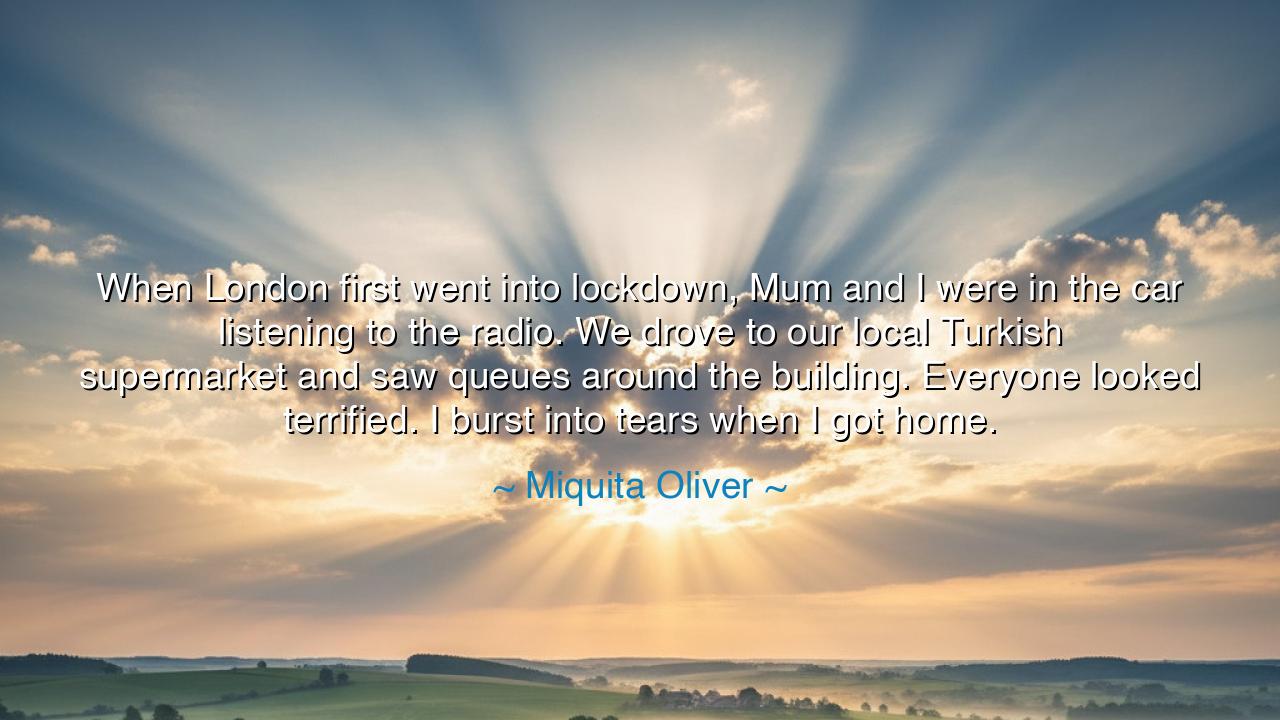
When London first went into lockdown, Mum and I were in the car
When London first went into lockdown, Mum and I were in the car listening to the radio. We drove to our local Turkish supermarket and saw queues around the building. Everyone looked terrified. I burst into tears when I got home.






In the annals of sudden winters, a voice bears witness to the hour when ordinary streets turned strange: “When London first went into lockdown, Mum and I were in the car listening to the radio. We drove to our local Turkish supermarket and saw queues around the building. Everyone looked terrified. I burst into tears when I got home.” So speaks Miquita Oliver, and her words ring like a bell struck in fog. They name the first bruise of a collective shock: the moment when the world narrows to headlines, headlights, and the hush of a house that used to be casual with laughter. The sentence is small, but it carries the weight of a season; it is a door left ajar on the midnight of a city.
Hear the currents running beneath each image. The radio is the old town crier, announcing the invisible siege; the car is a small ark, bearing two souls across a flood of rumor. The Turkish supermarket—a beloved corner of diaspora and daily bread—becomes a sentinel of scarcity, encircled by queues that braid fear with hope. Faces masked, glances lowered, a hush beneath the chatter: this is how panic wears its cloak. And the tears at home? They are the body’s liturgy of release, the recognition that bravery is not the absence of dread but the willingness to feel and still stand.
The origin of this feeling lies in rupture: a city famed for its constancy pauses, and the pause feels like a hand on the throat. We measure it in empty buses, in taped floors, in the echo of doorways where greetings used to bloom. Yet within the tale there is also a mother’s presence—Mum at the wheel, a pillar in the quake—reminding us that in every great unmooring, there is a human hand to hold. The lockdown shrinks the map to family, neighbors, merchants behind plexiglass; suddenly, the humble ritual of buying fruit becomes an act of courage and care.
Let history walk beside this scene so we may learn more than sorrow. In the Blitz, too, London queued—this time for rations and newsprint by candlelight. Men and women waited with the same taut shoulders, and yet learned to hum under their breath, to share crusts, to pour tea as if it were a treaty. Or think on the 1918 influenza, when cities worldwide invented distance overnight, posting notices in shop windows and sewing masks by lamplight. The pattern returns: fear crowds the doorway, and the people—stubborn, ingenious—rearrange the furniture of daily life until hospitality is possible again.
There is also quiet honor in the Turkish supermarket itself—immigrant shelves holding the neighborhood together. When borders closed, that corner shop was a borderless republic of peppers, lentils, and bread, staffed by clerks who learned to smile with their eyes. In many cities, such stores became outposts of steadiness; they taught us that resilience is not a slogan but a stockroom, a schedule, a set of hands counting change with care. To remember the queues is to remember the keepers of those doors.
What, then, is the teaching to carry forward when the sirens soften? First, that collective crises are felt most honestly in small scenes—two people in a car, a line in the rain, a kitchen where tears make room for breath. Second, that the measure of a city is not only in its monuments but in the tenderness of its ordinary exchanges: who yields a place in line, who checks on Mum, who tips the clerk, who calls the neighbor. Third, that courage begins with naming fear; only confessed dread can be converted into service.
Take these practical counsels as provisions for the next uncharted hour. (1) Keep a household ritual of news—one time, one station—so the radio informs but does not devour; then turn it off and tend to warmth. (2) Map your local lifelines—markets, pharmacists, elders—and commit to a cadence of checking in. (3) Practice queue kindness: bring an extra umbrella, share sanitizer, guard the dignity of those who wait. (4) Build a gratitude ledger for essential workers; write notes, pay promptly, remember names. (5) Protect the inner room: allow tears, prayer, and honest talk so the heart may metabolize the day and return to the street gentler, not harder. Do these, and the memory of that first lockdown will not be only a chamber of fear, but also a school of fellowship—a place where tenderness learned how to lead.
And when the dust of history settles on this page, let it be said: we learned from a small story how to live in a large storm. We learned that a city is a choir and a queue, a Mum and a market, a home and a horizon. We learned that the bravest sentence may begin in the softest voice—“I burst into tears”—and end as a covenant to look after one another until morning finds us again.






AAdministratorAdministrator
Welcome, honored guests. Please leave a comment, we will respond soon